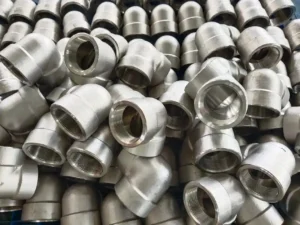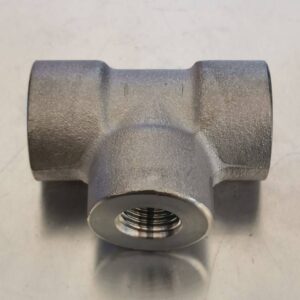Forged Pipe Fittings
What Are Forged Pipe Fittings?
Forged pipe fittings are components used to connect, control, or change the direction of pipes in a piping system. They are manufactured through the industrial forging process, where metal is shaped using localized compressive forces. This results in fittings with superior mechanical properties, making them ideal for high-pressure, high-temperature, and critical service applications. Common types include elbows, tees, couplings, unions, and plugs.

Benefits of Forging
The forging process offers significant advantages for pipe fittings. It refines the grain structure of the metal, making it denser and stronger. Forged fittings exhibit excellent impact strength, fatigue resistance, and overall durability. They are less prone to voids, porosity, and inclusions compared to other manufacturing methods, which greatly enhances their reliability and safety in demanding environments.
The Forging Process
The manufacturing of forged pipe fittings typically involves several steps: 1) Cutting a billet (a solid bar of metal) to the required size. 2) Heating the billet to a specific forging temperature. 3) Shaping the heated metal using a powerful press or hammer to form the desired fitting shape. 4) Performing heat treatment (like normalizing or quenching & tempering) to achieve the required mechanical properties. 5) Machining the forged part to precise dimensions and smooth surface finishes. 6) Undergoing rigorous testing and inspection to ensure quality.

Suitable Materials for Forged Fittings
A wide range of materials can be forged to create pipe fittings, selected based on the application’s service conditions. Common materials include:
Carbon Steel: (e.g., A105) For general purpose and high-strength applications.
Stainless Steel: (e.g., 304, 316) For corrosion resistance.
Alloy Steel: (e.g., F11, F22) For high-temperature and high-pressure services.
Duplex & Super Duplex Stainless Steel: For excellent strength and corrosion resistance.
Nickel Alloys: (e.g., Inconel, Monel, Hastelloy) For extreme corrosive and high-temperature environments.
Key Application Industries
Forged pipe fittings are critical components in industries where failure is not an option. Their primary applications include:
Oil & Gas: Onshore and offshore platforms, pipelines, refineries.
Petrochemical & Chemical Plants: Handling aggressive chemicals.
Power Generation: Fossil fuel, nuclear, and renewable energy plants.
Shipbuilding & Marine: For piping systems on vessels and offshore structures.
Water & Wastewater Treatment: In high-pressure sections of the plant.
Advantages Over Cast Fittings
Forged pipe fittings are generally superior to cast fittings for several reasons:
Strength & Reliability: The forging process creates a continuous grain flow, resulting in higher strength and better impact resistance than castings, which can have a more random, coarser grain structure and potential internal defects.
Density & Integrity: Forged fittings are denser and less porous, making them more leak-proof and suitable for high-pressure applications.
Cost-Effectiveness for Size: While casting might be more economical for very large, complex shapes, forging is often the preferred and more cost-effective choice for small to medium-sized fittings where high integrity is required.
Custom Manufacturing from Client Drawings
We understand that standard fittings may not meet every project’s unique requirements. Therefore, we offer custom manufacturing services for forged pipe fittings based on your specific drawings and specifications. Our advanced machining capabilities allow us to produce non-standard sizes, special geometries, and fittings from specialized materials to meet your exact needs.
